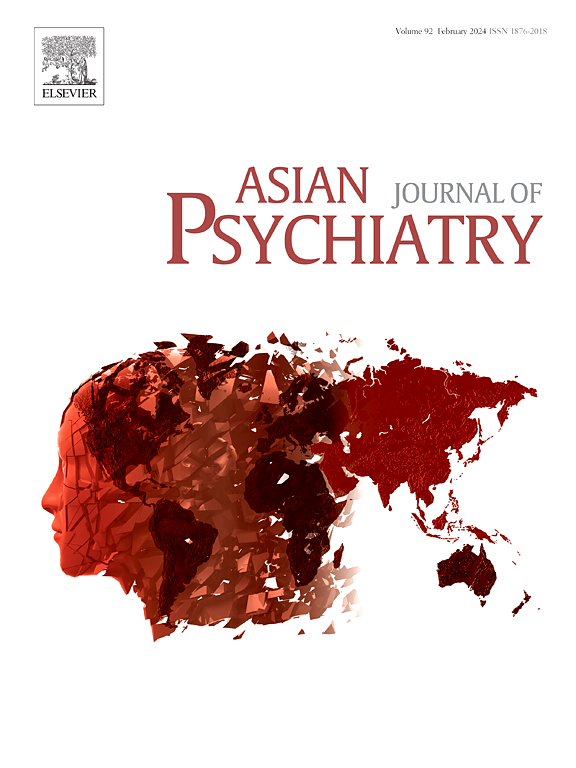A systematic review of clozapine in the Arab world: Patterns of use, barriers and facilitators in clinical practice
IF 4.5
4区 医学
Q1 PSYCHIATRY
引用次数: 0
Abstract
Background
Clozapine is the only drug licensed for treatment-resistant schizophrenia (TRS) but is grossly underutilised. It is essential to understand the use of Clozapine in clinical practice in the Arab world, where mental health services face numerous challenges, including stigma and resource limitations. This systematic review aims to evaluate existing evidence on clozapine usage, focusing on patterns, barriers, and future directions.
Method
We conducted a search using electronic databases (PubMed, Scopus, Embase, PsycINFO to identify studies published since 1982. The review adhered to the PRISMA guidelines and included studies on the use of clozapine in Arab countries. Two independent reviewers screened titles, abstracts, and full texts. They evaluated methodological quality using an adapted version of the Newcastle–Ottawa Scale, tailored for cross-sectional designs, and the JBI Critical Appraisal Checklist for Qualitative Research. Researchers extracted and synthesised data using an integrative approach, allowing for convergence across different study types.
Results
Eighteen studies from nine Arab countries were analyzed, involving a total of 6079 participants. Sample sizes varied significantly, ranging from 13 to 1246. Only 10 studies (55.6 %) provided sex-disaggregated data, all of which showed a male majority. The majority of studies were single-site retrospective or cross-sectional investigations, highlighting a regionally focused evidence base in the Middle East and North Africa. Four main themes were identified: implementation barriers, facilitators, adverse effects, and sociocultural influences. However, standardised outcome measures and patient perspectives were largely missing.
Conclusion
Despite its widespread use, clozapine is still underutilized in the Arab world due to systemic, clinical, and patient-level barriers. To improve outcomes in treatment-resistant schizophrenia, it is essential to address issues such as polypharmacy, inadequate training, limited access to monitoring, and non-adherence through targeted reforms and service integration.
阿拉伯世界氯氮平的系统综述:临床实践中的使用模式、障碍和促进因素
氯氮平是唯一获得许可用于治疗难治性精神分裂症(TRS)的药物,但使用率严重不足。了解氯氮平在阿拉伯世界临床实践中的使用是至关重要的,在阿拉伯世界,精神卫生服务面临许多挑战,包括耻辱和资源限制。本系统综述旨在评估氯氮平使用的现有证据,重点关注模式、障碍和未来方向。方法利用PubMed、Scopus、Embase、PsycINFO等电子数据库检索1982年以来发表的相关研究。审查遵循PRISMA指南,并包括关于氯氮平在阿拉伯国家使用的研究。两位独立审稿人筛选了题目、摘要和全文。他们使用为横断面设计量身定制的纽卡斯尔-渥太华量表的改编版本和JBI定性研究关键评估清单来评估方法质量。研究人员使用综合方法提取和合成数据,允许不同研究类型的收敛。结果分析了来自9个阿拉伯国家的18项研究,共涉及6079名参与者。样本量变化很大,从13到1246不等。只有10项研究(55.6% %)提供了按性别分类的数据,所有研究都显示男性占多数。大多数研究是单点回顾性或横断面调查,突出了中东和北非的区域重点证据基础。确定了四个主题:实施障碍、促进因素、不利影响和社会文化影响。然而,标准化的结果测量和患者观点在很大程度上缺失。结论尽管氯氮平被广泛使用,但由于系统、临床和患者层面的障碍,氯氮平在阿拉伯世界仍未得到充分利用。为了改善难治性精神分裂症的治疗结果,必须通过有针对性的改革和服务整合,解决多种用药、培训不足、监测机会有限和不遵守规定等问题。
本文章由计算机程序翻译,如有差异,请以英文原文为准。
求助全文
约1分钟内获得全文
求助全文
来源期刊

Asian journal of psychiatry
Medicine-Psychiatry and Mental Health
CiteScore
12.70
自引率
5.30%
发文量
297
审稿时长
35 days
期刊介绍:
The Asian Journal of Psychiatry serves as a comprehensive resource for psychiatrists, mental health clinicians, neurologists, physicians, mental health students, and policymakers. Its goal is to facilitate the exchange of research findings and clinical practices between Asia and the global community. The journal focuses on psychiatric research relevant to Asia, covering preclinical, clinical, service system, and policy development topics. It also highlights the socio-cultural diversity of the region in relation to mental health.
 求助内容:
求助内容: 应助结果提醒方式:
应助结果提醒方式:


